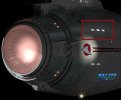If they moved from Mars to Jupiter it would have been necessary to compute a new heading.
I already addressed that. Any distance within the Solar System would be infinitesimal on the scale of an interstellar journey. Mars to Jupiter would be on the order of 1/10000 or less of the distance to intercept with V'Ger. It's the equivalent of, say, starting a 20-mile drive from a different parking space.
(Also, why choose Mars to Jupiter? They were already
past Jupiter when they went to warp.)
There is certainly not any indication from Kirk that the wormhole has given them a tremendous leg up on their journey. (Getting from Jupiter to considerably closer Vulcan would have to be considered an improvement.)
First off, you're assuming the only possible directions are closer or farther, as if it were one-dimensional. But that would still be along the same
heading, and Kirk specifically ordered a new heading, which means they moved
laterally relative to their original course.
Second, I never said they got "a tremendous leg up." I said that even a tiny change on an interstellar scale would still be large enough to take them out of the Solar System, because the entire Solar System is a parking lot on the scale of interstellar travel.
And if it did then Spock was incredibly lucky that the Enterprise landed plop right in front of him,
I'm not defending that part. The other criticisms fall apart when you look at the actual science and geometry of the situation, but this one is still valid. It's definitely a coincidence. I'm just saying it's not impossible. The wormhole threw them off course, but if we assume that it didn't throw them very
far off course, then given that Spock was approaching them from ahead already, it's at least within the realm of possibility that it brought them somewhat closer to him. Which is not a perfect explanation for the contrived timing of his arrival, but it works as a fudge that makes suspension of disbelief a little easier.
At the same time you bring up that this is easier for Spock to do because of his father (not a historically close relationship) you also don't think that he would have gotten any cooperation from actual Starfleet channels. (Arguably easier for him to do and probably with less personal cost.)
I was listing alternative possibilities, not asserting that they were all simultaneously true. My point is that he had several conceivable options for getting the information,
either with permission
or without it, so there's no reason to be surprised that he was able to get it
some way.
But it occurs to me that we're all overlooking something. V'Ger's approach may have been kept from the general public, but surely it would've been broadcast on government and Starfleet channels, so that first responders and people in authority would've been up to date on the situation and ready to take what measures they could. Even if no ships were in range to intercept the intruder, they would've needed to be ready to clean up the aftermath of its passage, so they would've needed to be in the loop about the emergency.
Which means there's no need for a special explanation of how Spock knew. The information would have been available to all Starfleet officers, at least the high-ranking ones, and Spock was still a Starfleet commander, if an "inactive" one.
-
Meanwhile, I've been thinking about the whole "only starship in interception range" issue, and I've been wondering if, instead of the
Enterprise being the only vessel of
any kind in range, maybe Kirk meant it was the only vessel in range equipped for exploration and first contact rather than pure defense -- since simply shooting at the intruder had already been proven futile by the Klingons. There might still have been a full defensive fleet surrounding Earth (presumably part of the defenses that V'Ger shut down using the codes it hacked from the
Enterprise computer), but it wouldn't have been adequate to do the investigative, scientific, or diplomatic work necessary to find a solution to the problem, given that brute force was clearly a non-starter.
Looked at in those terms, it's a lot more reasonable if the
Enterprise is the only ship of that type in range of Earth, since the rest are all out on the frontier boldly going. You don't need an explorer ship in the heartworlds, unless it's in drydock being rebuilt.
Indeed, TOS tended to use "starship" specifically to mean a deep-space capital ship of the
Enterprise's class, rather than a spaceship in general. So maybe Kirk saying "the only starship in interception range" was meant to be a continuation of that usage, saying that whatever other ships were in range were not of the specific type of the
Enterprise, the type that was needed for an unpredictable situation that might entail first contact, combat, or both.


